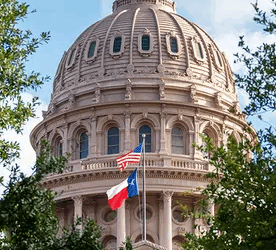By Warren L. Nelson
Tehran police have dispersed a crowd of chadorclad women demanding that the regime firmly enforce the rule that all women must cover their hair, reversing the normal way protests work in the Islamic Republic.
The pro-hejab protest served to underscore the fact that the Pezeshkian Administration is doing nothing to enforce the mandatory-hejab rule. And, more importantly, Pezeshkian is now supported by most of the hardline leadership, which has concluded that enforcing hejab is actually endangering the regime. There is clear agreement now that it is in the best interests of the regime to simply drop the issue.
The chador-clad women had been gathering for seven weeks in front of the Majlis to demand enforcement of the hejab rules. On some days, they numbered 1,500, according to press accounts. Finally, on March 28, the police blew their cool.
Mizan, the Judiciary’s news outlet, reported that the women “were requested to disperse and refrain from causing disruption, blocking roads and creating traffic congestion.
“A large number of protesters complied with the police order and left the area. But unfortunately, a small number— around 30 women—resisted,” Mizan reported. Mizan then posted a video showing the police moving in on the resisters, some of whom bashed the officers before the women were pushed out of the area.
Some of the women later said they had been pushed into police vans and released at Behest-e Zahra cemetery, south of the city near the last station on the Metro Red Line.
The deputy governor of Tehran defended the police action, explaining that the women did not first obtain a license to hold the protest, so their action was illegal. He didn’t say why the police waited seven weeks to stop such illegality.
Mohammad-Mannan Raisi, an ultra-hardline Majlis deputy, damned the Supreme National Security Council for its decision to halt enforcement of the mandatory-hejab rules a decision that could not have been made without the consent of Supreme Leader Ali Khamenehi. Raisi said the failure to enforce the rules risks alienating the staunchest supporters of the regime. But Deputy Mahmud Nabavian, a leader of the ultrarightwing Peydari Party, the largest in the Majlis, publicly condemned protests demanding hejab enforcement. He said preserving the Islamic Republic takes precedence over enforcing the dress code explicitly acknowledging the threat to the regime. “If implementing the hejab law creates tensions and weakens the system, it should automatically be set aside,” he said recently.
The regime’s continued refusal to enforce the hejab rules is a huge victory for President Pezeshkian, who publicly pushed for the non-enforcement policy. It is also a huge concession by Khamenehi, who had spent months insisting in one public speech after another that enforcement of the hejab rules was central to very foundation of an Islamic regime. Since December, Khamenehi has not been reported saying a word about hejab.
His 180-degree turn hints that he now sees hejab enforcement as threatening the existence of the regime. The break-up of the pro-hejab protest indicates the regime is now wedded to dropping the issue. It should be noted that despite the women’s protest and the remarks by Raisi, the Majlis has gone about its business the last few months while remaining mum on the issue.
That telegraphs that even the hardline leadership concedes that defending mandatory-hejab is not merely a losing issue, but an existential threat to the regime. Polls over the years show that even a majority of women who choose to cover their hair whenever they leave their homes oppose requiring women to do so. A few weeks ago, the UN Human Rights Council made headlines around the world when it issued a blistering report condemning the regime for harsh enforcement of the hejab rules. But that report was based on examples from many months ago and is no longer true. The regime had been using several techniques aimed at enforcement.
• Tickets sent to owners of cars seen with uncovered women inside. This appears to have been the most active enforcement mechanism because it did not require police officers to confront women, but only to write down license plate numbers used to pinpoint their owners.
• Visiting the owners of shops that were serving women who ignored hejab and threatening them with closure if they didn’t refuse service to such women. This technique was used for a few months last year until the massed fury of merchants caused the police to stop such warnings.
• Physical confrontations with uncovered women on the streets. This sometimes resulted in officers being attacked by angry pedestrians. A large proportion of officers did not like being put into such conflicts, and all such confrontations seem to have ended when Pezeshkian ordered a halt to enforcement in December.
• Facial recognition using street video cameras to pinpoint hejabless women. This does not appear to have ever worked. The Iran Times has not seen any reports on social media or in government reports of women being charged based on facial recognition. China uses facial recognition widely. But it has photos of wanted people and uses the security cameras on streets to pick out likely matches. The Islamic Republic wanted to do the exact opposite using the security cameras to pick out uncovered women and then searching photo ID records of more than 40 million Iranian women to find the offenders, a non-workable procedure.
• Police barricades at Metro station entrances and at major public events, like the Tehran Book Fair. No one was arrested at these barricades, but uncovered women were prevented from entering the Metro stations or the events. It was hoped this would deter women from going out uncovered.
These barricades seem to have ended with Pezeshkian’s announcement in December that he would not enforce the dress code. While hejab enforcement is dead in Tehran, that is not necessarily true throughout the country. Mohsen Mazaheri, the secretary of the Committee for Promoting Virtue and Preventing Vice in Esfahan province, boasted April 8 that his group had issued 97,500 warnings to women with uncovered hair over the Now Ruz holidays. But he spoke only of warnings and did not claim that any arrests had been made.
























